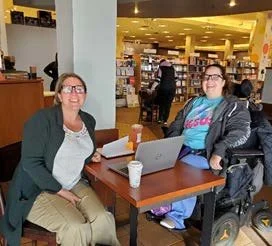Bethesda Research Initiatives
A short paragraph highlighting Bethesda's commitment to research and its importance to our mission.
A sentence or two about the types of research Bethesda is involved in (e.g., clinical trials, community-based research, collaborations with academic institutions)
Picture Exchange Communication System (PECS)
Partners include: Brock University, Pyramid Educational Consultants
As part of Bethesda’s ongoing commitment to expanding research opportunities with community partners, I am pleased to recognize Melissa Elliott, Clinical Supervisor, for her leadership in an innovative project that has made significant strides in the field of augmentative and alternative communication (AAC) for children with autism.
-
The Picture Exchange Communication System® (PECS®), one of the most researched AAC systems, has demonstrated significant benefits for children in improving their functional communication skills, social behaviours, and speech development. However, there has been a notable gap in research focusing on how to effectively train caregivers to support their children using PECS®. To address this need, Melissa Elliott, Clinical Supervisor at Bethesda and Dr. Julie Koudys of Brock University, partnered to launch the PECS®perts Collaborative in 2019. Together, they have led a dynamic, community-integrated research collaborative, bringing together Bethesda, Brock University and Pyramid Educational Consultants - the creators of PECS® - to develop innovative solutions.
As a community integrated research collaborative, PECS®perts focused on the development of efficient and effective caregiver and facilitator training in PECS®. The objectives of the Collaborative were to:
Increase access to evidence-based communication training for children;
Increase caregiver capacity to support their child’s communication system;
Enhance community capacity by providing training for professionals in the field, including our Francophone partners;
Develop culturally responsive augmentative and alternative communication options for Indigenous families; and
Create meaningful experiential learning opportunities for Brock University students.
Over the last few years, the Collaborative has researched, developed, implemented, and evaluated a caregiver-mediated PECS® intervention program with two models of service and has grown with the support of eight other community partners and one other university to meet these objectives.
The models developed include a brief 5-week model that takes just under 12 hours to complete and a 12-week model that requires fewer than 20 hours to complete. These models involve two types of sessions. One is an “Online Caregiver Training Session,” where caregivers meet individually with their PECS®perts facilitator to learn about the different PECS® teaching procedures and phases. The second model is a “Caregiver-Child Coaching Session” where caregivers and their child meet together with their facilitator, either online or in-person, to practice using PECS® together.
The development of this caregiver-mediated service has supported 60 children and their families and will continue to address these gaps in the services available to caregivers not only in Niagara, but provincially, nationally and internationally.
Throughout its development, the PECS®perts Collaborative has had the opportunity to present their research outcomes at key conferences, including:
2024: Ontario Association for Behaviour Analysis Annual Conference Toronto, Ontario
2024: Association of Professional Behavior Analysts Convention New Orleans, Louisiana
2023: Ontario Association for Behaviour Analysis Annual Conference Toronto, Ontario
2022: Ontario Association for Behaviour Analysis Annual Conference Toronto, Ontario
2022: Association for Behavior Analysis International Conference Dublin, Ireland
Now, I am pleased to announce that the PECS®perts team has had approval for their first academic article to be published in the Journal of Developmental and Physical Disabilities: Feasibility and Pilot Evaluation of a Telehealth Picture Exchange Communication System Caregiver Training.
Trauma-Informed Research
Partners include: Indiana University
In June 2024, Bethesda formed a strategic partnership with Indiana University, co-led by Dr. John M. Keesler, an Associate Professor and recognized authority in trauma and developmental disabilities. This collaborative research initiative aims to deepen our commitment to adopting Trauma-Informed Care practices. Key components of the project include the development of a qualitative survey and interview guide to capture client experiences with Trauma-Informed Care, along with the creation and validation of a streamlined quantitative assessment tool to measure these experiences effectively.
-
In partnership with individuals with lived experience, we will also produce an evidence-based practical guide designed to assist organizations supporting people with intellectual and developmental disabilities in implementing Trauma-Informed Care practices.
In September 2024, we began this work consulting directly with people with lived experience who are playing a vital and essential role in our project. Ashlee is one of our consultants. Ashlee is a self advocate and a paid research assistant at Brock University. She loves to read and make bracelets and she shares with us that she could go to Starbucks every day if she could. Ashlee has also earned her yellow belt in Para-Karate. When asked about her future goals, she shared, “I would love to have my own house in Niagara-on-the-Lake with the staff that I choose, not whatever the government gives me. I’d even be happy to live in a group home where I could help the staff with laundry and serve supper.”
“I am enjoying being apart of the Trauma-Informed Care, as a consultant, it is about time this sort of thing is happening, there are some that they help out for the honourium, and well that’s a great bonus. I want to change the world, for people with disabilities, especially those with IDD and other complex things like me, as we are super marginalized, and sometimes over looked.”-Ashlee
John M. Keesler, PhD, LMSW is an assistant professor in the School of Social Work at Indiana University Bloomington. He is originally from Buffalo, NY, and currently resides in Southern Indiana. He has more than 10 years practice experience in intellectual/developmental disabilities, with an emphasis on behavioral health.
Dr. Keesler conducts community-based research focusing on adversity/trauma, trauma-informed care, and quality of life, with an emphasis on these substantive areas in intellectual/developmental disability service organizations.


